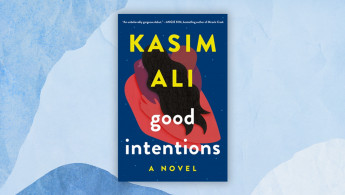Good Intentions: A thought-provoking inspection of British Muslim love and life
Good Intentions is the latest British Muslim novel to present a complex yet familiar portrait of second-generation Muslims trying to navigate life and love while being faced with different expectations at home and in the larger context of western society.
Kasim Ali’s thought-provoking novel is told from the perspective of Nur, an aspiring writer from a South Asian Muslim family, who is in a relationship with Yasmina, an ambitious and driven Sudanese Muslim girl.
Set in Birmingham, Bradford and Nottingham, the story oscillates in time to capture four years of their relationship and explores the complications and consequences of their falling in love.
"Good Intentions is most certainly a conversation starter and will hopefully encourage the publication of further novels that address the pervasive anti-black discrimination in the South Asian context that is often left unaddressed or brushed off"
Despite their shared religious beliefs, the couple’s differing cultural and family backgrounds become a source of nascent tension in their relationship.
The main conflict of the novel comes from the fact that while Yasmina has confided in her parents about her relationship with Nur, the young man has kept Yasmina a secret for four years, from not just his supposedly conservative parents, but also his siblings who would have been supportive if they’d known.
The novel portrays Nur’s journey as he struggles with having to keep Yasmina a “secret” from his family and the strain this puts on his mental health and personal relationships.
|
Good Intentions is most certainly a conversation starter and will hopefully encourage the publication of further novels that address the pervasive anti-black discrimination in the South Asian context that is often left unaddressed or brushed off.
Colourism and beauty bias in the community stems from the anti-black prejudice which some consider being a residue of the colonial era. Many South Asian families prefer their sons to marry women who are lighter-skinned and this is often set as a requirement for potential brides.
Darker-skinned girls are often rejected or considered to be less promising prospects for marriage. Some of these expectations and unspoken ideals seem to inform Nur’s assumption about his traditional South Asian family and how they would respond to him choosing a black woman as his partner in life.
An underlying message in Ali’s novel is that this issue may be more pervasive than people realise – anti-black prejudice certainly isn’t something that’s limited to older generations in the South Asian community, which is an unfair generalisation that assumes that older generations are always more narrow-minded or intolerant.
What makes Good Intentions a gripping story is the Muslim male protagonist. Nur is the kind of character we don’t always find in Muslim literature – there are not enough male characters whose point of view reveals the complications and consequences of dating and searching for love as a South Asian and Muslim millennial immigrant.
The novel’s British backdrop offers its own nuances with respect to experiences with gender, class, race and religion. Ultimately, Nur’s endless excuses and reasons for keeping his relationship a secret from his family may come across as a major red flag to many readers, and it is one of the shortcomings that makes him an uneasy protagonist to follow.
"Aside from being represented stereotypically, Muslim male characters face the burden of appearing perfect or harmless. Nur is neither of those things"
Nur is not likeable, and that may be what makes Ali’s novel stand out. At the same time, the reader also gets insight into Nur’s struggles with his mental health, eliciting empathy and understanding.
His struggles with anxiety and depression, and his vulnerabilities and struggles are clear to the reader, yet aside from a childhood best friend who truly understands his mental health, the people around him are not always aware of what he’s going through.
Mental health struggles are common in our communities and they’re often undetected, especially in men, because of the stigma associated with illnesses like depression, anxiety and suicidal ideation. The author depicts these important issues with sensitivity and care, through the portrayal of both Nur and Yasmina’s sister Hawa.
|
Nur’s inability to be honest with his parents raises questions about whether it’s fair to Yasmina, a young woman who certainly deserves to be with a man who would be proud to be by her side.
Since he’s the leading man in the story, Nur’s often infantile and cowardly behaviour is frustrating to read and parse. But perhaps that is exactly what makes him such a successful Muslim male character.
In writing a flawed, sometimes self-centred and genuinely cowardly character, Kasim Ali allows Nur to exist as a terrible human being – in a state of disgrace that Muslim male characters are often not afforded in literature.
Aside from being represented stereotypically, Muslim male characters face the burden of appearing perfect or harmless. Nur is neither of those things. And in being allowed to exist as a flawed (albeit fictional) human being, Nur rejects stereotypes and apologies about who he is and the community he represents.
Fair representation requires that along with the best of us, we also represent the terrible moments where people make mistakes or are simply not making the best decisions.
In reading this novel I often thought back to what insight the title could offer to understand the author’s intentions with this story. Maybe I’m wrong, but I’d like to think that Nur’s story tells us that sometimes for things to work out, we need something a little more than just good intentions.
Your heart may be in the right place, but for it to truly matter you have to put in the work and experience the discomfort of growing, creating change and bringing something beautiful to the light.
If you like reading books about complicated or unlikable human beings, Good Intentions is a great option as it is also layered, culturally and politically relevant, and thought-provoking.
Sumaiyya Naseem is a Bookstagrammer and freelance writer and editor who specialises in Middle Eastern and Muslim stories. In 2019 she joined the Reading Women Podcast as a guest contributor to talk about South Asian and Middle Eastern narratives.
Follow her on Instagram: @sumaiyya.books



